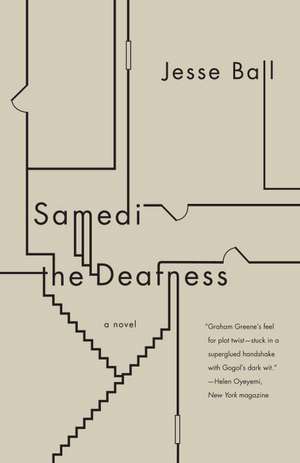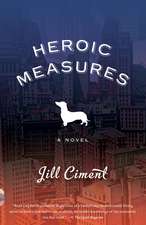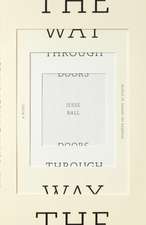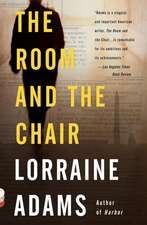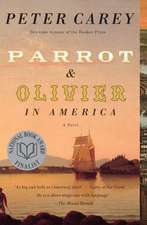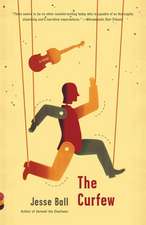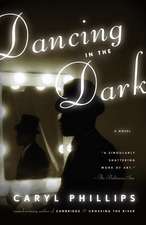Samedi the Deafness: Vintage Contemporaries
Autor Jesse Ballen Limba Engleză Paperback – 31 aug 2007
What follows is a spellbinding game of cat and mouse as James is abducted, brought to an asylum, and seduced by a woman in yellow. Who is lying? What is Samedi? And what will happen on the seventh day?
Din seria Vintage Contemporaries
-
 Preț: 109.95 lei
Preț: 109.95 lei -
 Preț: 101.80 lei
Preț: 101.80 lei -
 Preț: 96.52 lei
Preț: 96.52 lei -
 Preț: 107.46 lei
Preț: 107.46 lei -
 Preț: 91.77 lei
Preț: 91.77 lei -
 Preț: 101.88 lei
Preț: 101.88 lei -
 Preț: 111.51 lei
Preț: 111.51 lei -
 Preț: 119.87 lei
Preț: 119.87 lei -
 Preț: 87.84 lei
Preț: 87.84 lei -
 Preț: 97.34 lei
Preț: 97.34 lei -
 Preț: 111.92 lei
Preț: 111.92 lei -
 Preț: 117.87 lei
Preț: 117.87 lei -
 Preț: 95.92 lei
Preț: 95.92 lei -
 Preț: 113.56 lei
Preț: 113.56 lei -
 Preț: 132.88 lei
Preț: 132.88 lei -
 Preț: 108.09 lei
Preț: 108.09 lei -
 Preț: 115.42 lei
Preț: 115.42 lei -
 Preț: 106.04 lei
Preț: 106.04 lei -
 Preț: 96.93 lei
Preț: 96.93 lei -
 Preț: 90.64 lei
Preț: 90.64 lei -
 Preț: 105.41 lei
Preț: 105.41 lei -
 Preț: 99.60 lei
Preț: 99.60 lei -
 Preț: 105.82 lei
Preț: 105.82 lei -
 Preț: 99.30 lei
Preț: 99.30 lei -
 Preț: 129.78 lei
Preț: 129.78 lei -
 Preț: 103.74 lei
Preț: 103.74 lei -
 Preț: 100.98 lei
Preț: 100.98 lei -
 Preț: 100.76 lei
Preț: 100.76 lei -
 Preț: 89.09 lei
Preț: 89.09 lei -
 Preț: 115.94 lei
Preț: 115.94 lei -
 Preț: 101.24 lei
Preț: 101.24 lei -
 Preț: 125.13 lei
Preț: 125.13 lei -
 Preț: 89.50 lei
Preț: 89.50 lei -
 Preț: 100.35 lei
Preț: 100.35 lei -
 Preț: 139.63 lei
Preț: 139.63 lei -
 Preț: 93.85 lei
Preț: 93.85 lei -
 Preț: 106.45 lei
Preț: 106.45 lei -
 Preț: 96.11 lei
Preț: 96.11 lei -
 Preț: 107.92 lei
Preț: 107.92 lei -
 Preț: 77.02 lei
Preț: 77.02 lei -
 Preț: 125.21 lei
Preț: 125.21 lei -
 Preț: 96.93 lei
Preț: 96.93 lei -
 Preț: 112.11 lei
Preț: 112.11 lei -
 Preț: 83.94 lei
Preț: 83.94 lei -
 Preț: 101.58 lei
Preț: 101.58 lei -
 Preț: 106.04 lei
Preț: 106.04 lei -
 Preț: 97.15 lei
Preț: 97.15 lei -
 Preț: 111.76 lei
Preț: 111.76 lei -
 Preț: 100.57 lei
Preț: 100.57 lei -
 Preț: 99.75 lei
Preț: 99.75 lei
Preț: 101.39 lei
Nou
Puncte Express: 152
Preț estimativ în valută:
19.40€ • 20.04$ • 16.15£
19.40€ • 20.04$ • 16.15£
Carte disponibilă
Livrare economică 04-18 martie
Preluare comenzi: 021 569.72.76
Specificații
ISBN-13: 9780307278852
ISBN-10: 0307278859
Pagini: 291
Dimensiuni: 154 x 202 x 17 mm
Greutate: 0.23 kg
Editura: Vintage Books USA
Seria Vintage Contemporaries
ISBN-10: 0307278859
Pagini: 291
Dimensiuni: 154 x 202 x 17 mm
Greutate: 0.23 kg
Editura: Vintage Books USA
Seria Vintage Contemporaries
Notă biografică
Jesse Ball (1978-) was born in Long Island, the second child of Robert and Catherine Ball. Educated at Vassar College and Columbia University, he has lived at times in Europe, and has worked as an editor, a croupier, a tutor, and a photographer. His first volume, March Book, appeared in 2004, followed by Vera & Linus (2006). His drawings were published in 2006 in Iceland in the volume Og svo kom nottin. Work of his has appeared in many major domestic and international journals, and was included in Best American Poetry 2006. Jesse Ball was a Spy but has Retired to the Country, a website, showcases much work of writing and drawing.
Extras
Day the first
James Sim rose on a Sunday morning
And dressed quietly in the dark. He did not switch on the light before descending the stairs. He did not put on the light in the hall.
—I came in the front, he said beneath his breath. Best to leave by the side door.
It was early yet, and the clouds that had gathered near and made of themselves rain all through the night were now intent on going elsewhere. But it takes the minds of clouds a long time to effect their prodigious actions; the immediate result was solely a sort of paleness, a lightening of countenance.
At the nearest market, a balding man with an angry nose was crouched counting in the till. James bought from him a newspaper, folded it under his arm and continued. The change that James gave the man was put on the counter, separate from the business of counting that had been going on.
Is it too much to say that there was in James a small sadness for his change kept apart from the rest?
Sunday was always the best of days for being the self you had intended to be, but were not, for one or another reason. This was true most of all for those without families, those without friends. He thought, then: We of the mnemonist profession are always discrete in our ways. This pleased him. He said it aloud as he passed again into the morning as though entering some familiar hall.
—Of course, we of the mnemonist profession are always discrete in our ways.
A boy of about eleven was on a footpath soon to join that of James. He looked up as James spoke. The footpaths were passing by a row of houses. In one, another boy was sitting on the edge of a dilapidated sand-box strewn with broken toys and faded color.
—Farrell is a weakling! Farrell is a weak weak weakling! yelled the boy at James's side.
The boy in the yard looked up with pained recognition. Immediately he put his hands over his eyes and hid his face.
—A weak weak weakling! A weakling! shouted the boy again.
—Listen, you, said James, raising up the back of his hand.
But the first boy had already run off. He was mostly gone in fact. Boys change so quickly at that age, it was hard to say certainly that the boy away now beneath the trees was even the same one.
James continued. Behind him, the boy sitting in the yard was lost to sight. Is it crueler to be cruel when alone, or to be cruel in front of others?
When alone, perhaps.
That's why they say people who are cruel to animals should be punished so badly. For everyone's good. Not really for the animals.
James set the newspaper beside him on the bench. The park ran beneath a cliff that hung above a river. Three bridges crossed the air above, and it was his way to sit beneath the third of these on a bench upon a small outcrop of rock. Away to his right a field stretched.
Perhaps it was crueler to be cruel when in company.
Birds were diving back and forth between the limbs of trees, and an ephemeral greenness cast by the morning hung over the late-autumn park. He would have liked to tie strings to all the birds, to all the branches of trees, to all the whirling leaves and the swells upon the river, and pull with his hand, here and there, the glad enormity of morning, of that very Sunday morning. To take up in his hand the paths across which he had come, the boy running ahead upon the path, the boy behind, face covered, the bald shopkeeper with his regimented monies, the small door in the side of his house . . . But what then would he do with them?
A sort of shout came. James looked up. In the field, the figure of a man, bent over. James stood. The man shouted again, and lurched to the closeness of the ground. James looked about him. The park was empty. Leaving the newspaper, the bench, the path, he ran across the flatness of grass.
The man was lying in a crumpled fashion.
—Are you all right?
The man turned on his side. His coat was open and the skin of the front of his body was like a rent and torn shirt. He must have been stabbed at least a half dozen times. James hesitated.
—I'll fetch an ambulance.
The man made a painful sort of noise.
—Did you see them? the man asked. Did you see them?
—What? asked James.
—They must have gone past you.
How could the man be alive? It must have happened within seconds. But where had the attackers gone?
The man was crouched in a way that James recognized. It was the manner of a dog that had been severely wounded by another dog in the presence of people and other dogs who all had done nothing to stop any of it. Furthermore, he, as such a dog, might feel sternly and clearly that any help soon to be forthcoming would be of no use to him, and that rather, perhaps, it were better that he be left alone, and certainly not looked at in this horrible manner.
—I'm going to get an ambulance, said James.
—There's no time for that, said the man, grimacing and puffing with his cheeks in an unpleasant way. I'll be dead before it comes. And what if they come back?
The man began to cough. James looked away at the river. Its surface was wet, and pierced with innumerable ripples and deformities. The liquid came up against the shore, leaving marks of wetness along the sand, along the bases of trees, upon everything it touched. It made him want to vomit.
—That's no way to talk, said James.
He had put his hands into his pockets. He drew them out, but suddenly didn't know where to hold them. He put them back in again.
—What's your name? he said.
He looked at his feet as he said this.
—Thomas McHale, said the man. They've killed me.
—Did they take anything of value? asked James.
—That's useless, said Thomas McHale. That's useless to say to me.
He was quiet for a moment.
—I was one of them, but I left, and they didn't want me to leave. Have you seen the paper? Samedi? The conspirators? I was one of them. I didn't have the stomach for it, and I left.
The man groaned and rolled onto his back. This prompted a fresh pulsing of the wounds; more blood issued forth out of his broken chest.
—What's there to do? McHale groaned. You must do it. You must expose them.
James stood a few feet away, uncomfortably watching. He wanted none of this.
—I don't know, he said. I don't know what you mean.
—Listen, said McHale, there's no time.
He was wretched with his dying. James didn't want to look, but there is something hypnotic about such final speeches, and he listened even as his eyes slid along the filthiness of the river.
—The man, the man in charge, Samedi, is tall and fat but carries it well, if you understand. A mole beneath his left eye, and he--
McHale broke off with a fit of coughing. Blood began to come out of his mouth.
—He never goes out in public, or in the sun. His skin is pale. He is with a younger man, who dresses well, scornful, black hair, a childish face.
—But how would I find them? asked James. What would be the point?
—First, look for a man, Estrainger, his name is. He lives near the Chinese district. Poses as a playwright, but really he's an agent of . . . Samedi's. About fifty. Fifty or sixty. Gray hair. Small.
McHale's efforts were dwindling. He lay for a while, just breathing with his eyes closed. James decided to go for the ambulance. He started to move off, but McHale spoke again.
—Another under the name of Sermon. Supposedly a psychologist. Young and conceited. Surrounds himself with women.
—What's this Samedi's name? asked James. Who are these people?
—It's useless, said McHale, it's useless.
He trailed off, mumbling.
—They've ended me, ended me. I knew they would. I told Thomas. I told him they would; he put me away.
—What are you saying? asked James. I don't understand.
—The daughter, Grieve, said McHale. The handler, Torquin. Many of them in a house, I can't even say where. I was held there. I jumped the wall, ran for hours.
His speech trailed off again into a mumbling of names and phrases. James could not make them out. All around McHale the grass bore the deep stamp of his bleeding. His chest heaved and bucked and slowed. McHale was right—there wouldn't have been time for an ambulance. But who was to blame? The thought came closer, became more definite. Whoever had done it must still be near.
James stood and looked hastily about him. No one was upon the meadow or on the near paths. He could see past the second bridge, but not all the way to the first. There were boats upon the river, but too far to make out figures. There were people on the bridge. None seemed to be watching, though in truth he couldn't tell.
The best thing to do, of course, was to leave immediately. This is what comes of going out for a walk in the morning. Anyone who leaves their house deserves what they get.
McHale was absent when James looked back; his body, unmoving, was now more a part of the ground than of the world itself.
I shouldn't stay, thought James. Again, he hesitated. He felt better now that the man could no longer demand anything of him. By being dead, he had made himself no longer James's business.
And so James hurried away, and when he had reached the street and boarded a bus, and ridden the bus for seven blocks, he felt much better, and for the next hour he pretended that none of it had happened.
The Hour After That
James bought a newspaper—the first was still on the bench where he had left it.
AN ITEM IN THE NEWS:
QUESTIONS REMAIN OVER MAN'S SUICIDE OUTSIDE WHITE HOUSE
Washington, September 27: Federal authorities have commenced a probe into a suicide yesterday that occurred outside the White House gates.
According to eyewitnesses, at nine a.m., William Goshen, thirty-eight, a native of Washington and practicing psychologist, cut his own throat with a knife as he stood facing the White House. He was pronounced dead upon the arrival of paramedics.
The letter, which gives no addressee, was made public at an afternoon White House press conference:
SEVEN DAYS AND THEN THE ROD. PATHS THAT HAVE BEEN TAKEN ARE WRONG AND MUST BE CORRECTED. THOSE WHO CAN SHOULD NOW DO WHAT THEY WILL TO CHANGE THE WORLD AND LEAVE THEIR NATION IF THEY DO NOT LIKE WHAT IT DOES.
SEVEN DAYS, THEN. SEVEN DAYS AND THEN THE ROD.
SAMEDI
As of press time, authorities have few insights into the incident. The signature "Samedi" has returned no clues, and it is unclear whether the moniker refers to Goshen himself, or some other member of a possible organization. Despite exhaustive research, Goshen has not been linked to any terrorist groups or fringe religious organizations.
Goshen is survived by a wife, from whom he separated earlier this year, and a son, age nine.
A Few Minutes Passed, Then James
motioned with his hand. The waitress, sitting at the far end of the counter, rose and came over.
—What'll it be, then?
Her mouth was pursed as she said this. She was of the sort who purse their mouths in order to defend themselves from a thing that people cannot defend themselves against. This undefined thing, this bleakness, arises much in those who work late at night in places lit by fluorescent lights, places attended by people who are strangers to each other and will always remain so.
—More hot water for the tea. Also . . .
James tapped the menu above a particular item. In this way he made it clear that he preferred to be served rather than to speak. He prized such gestures, and kept them in a sort of wooden box. That is, he thought of them as being kept in a wooden box. It was his specialty, of course, to think of things in particular ways, and thus have hold of them whenever he should need to.
What Should Be Done
There was a pencil on the counter. James wrote on the back of a napkin:
What should be done?
Beneath it, he wrote:
nothing
This he crossed out. Beneath that:
tell someone, the police.
He looked at the napkin. He felt then that there were two of them in the room, he and the napkin, and that one of them would have to go. He crumpled up the napkin.
The waitress came back. She had with her the specified items. James took them. He felt somehow that by placing them upon the counter in some way, a solution would unfold itself. He poured more hot water into his cup. Steam rose. That was good, he thought. Steam was good. It had often been a solution to problems. Why not now? The eggs and toast that he had ordered no longer interested him. He ate them methodically, looking up every now and then as one does in public places to see if anyone was watching him. Someone was.
Someone Was
a girl in a well-tailored yellow dress came over when their eyes met.
—Say, James, she began.
—I'm sorry, he said, do I know you?
Certainly he had never seen the girl before.
—I shouldn't think so, she said.
Her face was framed by short black hair. She spoke with a thick accent. I will not marry you, thought James. You are not suitable at all. I don't like your yellow-dress. I don't like your hair-cut, and I don't like your approaching-of-men in public places. But, he was smiling.
—You dropped this, I think.
She was holding James's wallet.
James took it from her. He examined the contents. Nothing was missing.
—Nothing is missing, she said.
He took a long look at her.
—How could you know that? he asked. Someone could have taken something before you found it.
—Not true, she said. I saw you drop it, and then I picked it up.
—When was this? James asked.
—On the bus.
They looked at each other. James felt that he had been outmaneuvered. He did not like this feeling very much.
James Sim rose on a Sunday morning
And dressed quietly in the dark. He did not switch on the light before descending the stairs. He did not put on the light in the hall.
—I came in the front, he said beneath his breath. Best to leave by the side door.
It was early yet, and the clouds that had gathered near and made of themselves rain all through the night were now intent on going elsewhere. But it takes the minds of clouds a long time to effect their prodigious actions; the immediate result was solely a sort of paleness, a lightening of countenance.
At the nearest market, a balding man with an angry nose was crouched counting in the till. James bought from him a newspaper, folded it under his arm and continued. The change that James gave the man was put on the counter, separate from the business of counting that had been going on.
Is it too much to say that there was in James a small sadness for his change kept apart from the rest?
Sunday was always the best of days for being the self you had intended to be, but were not, for one or another reason. This was true most of all for those without families, those without friends. He thought, then: We of the mnemonist profession are always discrete in our ways. This pleased him. He said it aloud as he passed again into the morning as though entering some familiar hall.
—Of course, we of the mnemonist profession are always discrete in our ways.
A boy of about eleven was on a footpath soon to join that of James. He looked up as James spoke. The footpaths were passing by a row of houses. In one, another boy was sitting on the edge of a dilapidated sand-box strewn with broken toys and faded color.
—Farrell is a weakling! Farrell is a weak weak weakling! yelled the boy at James's side.
The boy in the yard looked up with pained recognition. Immediately he put his hands over his eyes and hid his face.
—A weak weak weakling! A weakling! shouted the boy again.
—Listen, you, said James, raising up the back of his hand.
But the first boy had already run off. He was mostly gone in fact. Boys change so quickly at that age, it was hard to say certainly that the boy away now beneath the trees was even the same one.
James continued. Behind him, the boy sitting in the yard was lost to sight. Is it crueler to be cruel when alone, or to be cruel in front of others?
When alone, perhaps.
That's why they say people who are cruel to animals should be punished so badly. For everyone's good. Not really for the animals.
James set the newspaper beside him on the bench. The park ran beneath a cliff that hung above a river. Three bridges crossed the air above, and it was his way to sit beneath the third of these on a bench upon a small outcrop of rock. Away to his right a field stretched.
Perhaps it was crueler to be cruel when in company.
Birds were diving back and forth between the limbs of trees, and an ephemeral greenness cast by the morning hung over the late-autumn park. He would have liked to tie strings to all the birds, to all the branches of trees, to all the whirling leaves and the swells upon the river, and pull with his hand, here and there, the glad enormity of morning, of that very Sunday morning. To take up in his hand the paths across which he had come, the boy running ahead upon the path, the boy behind, face covered, the bald shopkeeper with his regimented monies, the small door in the side of his house . . . But what then would he do with them?
A sort of shout came. James looked up. In the field, the figure of a man, bent over. James stood. The man shouted again, and lurched to the closeness of the ground. James looked about him. The park was empty. Leaving the newspaper, the bench, the path, he ran across the flatness of grass.
The man was lying in a crumpled fashion.
—Are you all right?
The man turned on his side. His coat was open and the skin of the front of his body was like a rent and torn shirt. He must have been stabbed at least a half dozen times. James hesitated.
—I'll fetch an ambulance.
The man made a painful sort of noise.
—Did you see them? the man asked. Did you see them?
—What? asked James.
—They must have gone past you.
How could the man be alive? It must have happened within seconds. But where had the attackers gone?
The man was crouched in a way that James recognized. It was the manner of a dog that had been severely wounded by another dog in the presence of people and other dogs who all had done nothing to stop any of it. Furthermore, he, as such a dog, might feel sternly and clearly that any help soon to be forthcoming would be of no use to him, and that rather, perhaps, it were better that he be left alone, and certainly not looked at in this horrible manner.
—I'm going to get an ambulance, said James.
—There's no time for that, said the man, grimacing and puffing with his cheeks in an unpleasant way. I'll be dead before it comes. And what if they come back?
The man began to cough. James looked away at the river. Its surface was wet, and pierced with innumerable ripples and deformities. The liquid came up against the shore, leaving marks of wetness along the sand, along the bases of trees, upon everything it touched. It made him want to vomit.
—That's no way to talk, said James.
He had put his hands into his pockets. He drew them out, but suddenly didn't know where to hold them. He put them back in again.
—What's your name? he said.
He looked at his feet as he said this.
—Thomas McHale, said the man. They've killed me.
—Did they take anything of value? asked James.
—That's useless, said Thomas McHale. That's useless to say to me.
He was quiet for a moment.
—I was one of them, but I left, and they didn't want me to leave. Have you seen the paper? Samedi? The conspirators? I was one of them. I didn't have the stomach for it, and I left.
The man groaned and rolled onto his back. This prompted a fresh pulsing of the wounds; more blood issued forth out of his broken chest.
—What's there to do? McHale groaned. You must do it. You must expose them.
James stood a few feet away, uncomfortably watching. He wanted none of this.
—I don't know, he said. I don't know what you mean.
—Listen, said McHale, there's no time.
He was wretched with his dying. James didn't want to look, but there is something hypnotic about such final speeches, and he listened even as his eyes slid along the filthiness of the river.
—The man, the man in charge, Samedi, is tall and fat but carries it well, if you understand. A mole beneath his left eye, and he--
McHale broke off with a fit of coughing. Blood began to come out of his mouth.
—He never goes out in public, or in the sun. His skin is pale. He is with a younger man, who dresses well, scornful, black hair, a childish face.
—But how would I find them? asked James. What would be the point?
—First, look for a man, Estrainger, his name is. He lives near the Chinese district. Poses as a playwright, but really he's an agent of . . . Samedi's. About fifty. Fifty or sixty. Gray hair. Small.
McHale's efforts were dwindling. He lay for a while, just breathing with his eyes closed. James decided to go for the ambulance. He started to move off, but McHale spoke again.
—Another under the name of Sermon. Supposedly a psychologist. Young and conceited. Surrounds himself with women.
—What's this Samedi's name? asked James. Who are these people?
—It's useless, said McHale, it's useless.
He trailed off, mumbling.
—They've ended me, ended me. I knew they would. I told Thomas. I told him they would; he put me away.
—What are you saying? asked James. I don't understand.
—The daughter, Grieve, said McHale. The handler, Torquin. Many of them in a house, I can't even say where. I was held there. I jumped the wall, ran for hours.
His speech trailed off again into a mumbling of names and phrases. James could not make them out. All around McHale the grass bore the deep stamp of his bleeding. His chest heaved and bucked and slowed. McHale was right—there wouldn't have been time for an ambulance. But who was to blame? The thought came closer, became more definite. Whoever had done it must still be near.
James stood and looked hastily about him. No one was upon the meadow or on the near paths. He could see past the second bridge, but not all the way to the first. There were boats upon the river, but too far to make out figures. There were people on the bridge. None seemed to be watching, though in truth he couldn't tell.
The best thing to do, of course, was to leave immediately. This is what comes of going out for a walk in the morning. Anyone who leaves their house deserves what they get.
McHale was absent when James looked back; his body, unmoving, was now more a part of the ground than of the world itself.
I shouldn't stay, thought James. Again, he hesitated. He felt better now that the man could no longer demand anything of him. By being dead, he had made himself no longer James's business.
And so James hurried away, and when he had reached the street and boarded a bus, and ridden the bus for seven blocks, he felt much better, and for the next hour he pretended that none of it had happened.
The Hour After That
James bought a newspaper—the first was still on the bench where he had left it.
AN ITEM IN THE NEWS:
QUESTIONS REMAIN OVER MAN'S SUICIDE OUTSIDE WHITE HOUSE
Washington, September 27: Federal authorities have commenced a probe into a suicide yesterday that occurred outside the White House gates.
According to eyewitnesses, at nine a.m., William Goshen, thirty-eight, a native of Washington and practicing psychologist, cut his own throat with a knife as he stood facing the White House. He was pronounced dead upon the arrival of paramedics.
The letter, which gives no addressee, was made public at an afternoon White House press conference:
SEVEN DAYS AND THEN THE ROD. PATHS THAT HAVE BEEN TAKEN ARE WRONG AND MUST BE CORRECTED. THOSE WHO CAN SHOULD NOW DO WHAT THEY WILL TO CHANGE THE WORLD AND LEAVE THEIR NATION IF THEY DO NOT LIKE WHAT IT DOES.
SEVEN DAYS, THEN. SEVEN DAYS AND THEN THE ROD.
SAMEDI
As of press time, authorities have few insights into the incident. The signature "Samedi" has returned no clues, and it is unclear whether the moniker refers to Goshen himself, or some other member of a possible organization. Despite exhaustive research, Goshen has not been linked to any terrorist groups or fringe religious organizations.
Goshen is survived by a wife, from whom he separated earlier this year, and a son, age nine.
A Few Minutes Passed, Then James
motioned with his hand. The waitress, sitting at the far end of the counter, rose and came over.
—What'll it be, then?
Her mouth was pursed as she said this. She was of the sort who purse their mouths in order to defend themselves from a thing that people cannot defend themselves against. This undefined thing, this bleakness, arises much in those who work late at night in places lit by fluorescent lights, places attended by people who are strangers to each other and will always remain so.
—More hot water for the tea. Also . . .
James tapped the menu above a particular item. In this way he made it clear that he preferred to be served rather than to speak. He prized such gestures, and kept them in a sort of wooden box. That is, he thought of them as being kept in a wooden box. It was his specialty, of course, to think of things in particular ways, and thus have hold of them whenever he should need to.
What Should Be Done
There was a pencil on the counter. James wrote on the back of a napkin:
What should be done?
Beneath it, he wrote:
nothing
This he crossed out. Beneath that:
tell someone, the police.
He looked at the napkin. He felt then that there were two of them in the room, he and the napkin, and that one of them would have to go. He crumpled up the napkin.
The waitress came back. She had with her the specified items. James took them. He felt somehow that by placing them upon the counter in some way, a solution would unfold itself. He poured more hot water into his cup. Steam rose. That was good, he thought. Steam was good. It had often been a solution to problems. Why not now? The eggs and toast that he had ordered no longer interested him. He ate them methodically, looking up every now and then as one does in public places to see if anyone was watching him. Someone was.
Someone Was
a girl in a well-tailored yellow dress came over when their eyes met.
—Say, James, she began.
—I'm sorry, he said, do I know you?
Certainly he had never seen the girl before.
—I shouldn't think so, she said.
Her face was framed by short black hair. She spoke with a thick accent. I will not marry you, thought James. You are not suitable at all. I don't like your yellow-dress. I don't like your hair-cut, and I don't like your approaching-of-men in public places. But, he was smiling.
—You dropped this, I think.
She was holding James's wallet.
James took it from her. He examined the contents. Nothing was missing.
—Nothing is missing, she said.
He took a long look at her.
—How could you know that? he asked. Someone could have taken something before you found it.
—Not true, she said. I saw you drop it, and then I picked it up.
—When was this? James asked.
—On the bus.
They looked at each other. James felt that he had been outmaneuvered. He did not like this feeling very much.
Recenzii
“A strange modern thriller--Kafka meets Hitchcock--laden with questions about truth, identity, memory, and the importance of names, a story that casts an unsettling spell.”
—Keith Donohue, author of The Stolen Child
“Like a tale by Lewis Carroll or a film by David Lynch, Samedi the Deafness teeters on the edge of unreality, plunges right in, and comes back again full circle. From its labyrinth of fictions, through the doubling and deceptive mirrors lining its walls and corridors, spills the eerie glow of some strange, ineffable truth.”
—Tom McCarthy, author of Remainder
“Samedi the Deafness is an urgent book . . . trying intently to tell us something about our world and our way of living, and it challenges us to listen. No serious reader can refuse this challenge.”
—Paul La Farge, author of Haussmann, or the Distinction
—Keith Donohue, author of The Stolen Child
“Like a tale by Lewis Carroll or a film by David Lynch, Samedi the Deafness teeters on the edge of unreality, plunges right in, and comes back again full circle. From its labyrinth of fictions, through the doubling and deceptive mirrors lining its walls and corridors, spills the eerie glow of some strange, ineffable truth.”
—Tom McCarthy, author of Remainder
“Samedi the Deafness is an urgent book . . . trying intently to tell us something about our world and our way of living, and it challenges us to listen. No serious reader can refuse this challenge.”
—Paul La Farge, author of Haussmann, or the Distinction
Descriere
A stunning debut, this work is a dream-like spy novel set in an asylum for the curing of chronic liars. Like a tale by Lewis Carroll or a film by David Lynch, [it] teeters on the edge of unreality, plunges right in, and comes back again full circle--Tom McCarthy, author of "Remainder."
